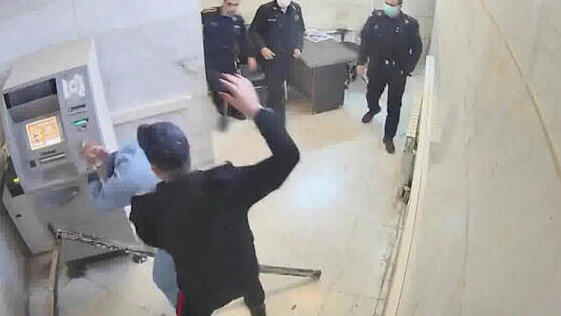Israel launched a concentrated attack Monday on the power bases of Iran’s mullah regime, aiming to weaken them in order to enable a potential future uprising.
Since the start of Operation Rising Lion, IDF strikes had focused on regime symbols. Now, it is also targeting the security apparatus responsible for the regime’s survival—specifically, the Revolutionary Guards, Iran’s internal security services and the headquarters of the Basij militia, a paramilitary volunteer militia established in Iran in 1979 by order of Ayatollah Ruhollah Khomeini.
Attacking the entrance to Evin prison
The objective is to weaken and destabilize these forces, which have historically suppressed public dissent, to create space for internal Iranian elements to eventually mobilize and challenge the regime.
A secondary aim of the operation is to establish a new strategic equation: if Iran continues to launch missiles at Israeli civilians, Israel will escalate pressure by threatening what matters most to the regime—its survival.
The Revolutionary Guards were created to preserve mullah rule and export the Islamic Revolution throughout Iran and the Middle East. They also command the Basij militias, which include nearly one million civilian members. Should Iran persist, Israel may expand its strikes to directly target the regime’s core leadership, including Ayatollah Ali Khamenei.
Experts estimate that any potential uprising inside Iran is unlikely to occur immediately. While certain groups—including armed factions like the Mujahedeen-e-Khalq—are positioned to rise against the regime, most analysts believe such a scenario would only materialize after the current military campaign concludes.
1 View gallery


A frame grab taken from video shows a guard beating a prisoner at Evin prison in Tehran, Iran
(Photo: AP)
As long as Israeli strikes are ongoing, mass protests remain unlikely: many Iranians fear leaving their homes, and regime loyalists continue to rally around the government. A more plausible timeline for unrest would be once opposition forces feel safe enough to organize, communicate and act collectively.
Meanwhile, the targeting of regime symbols and security bases is intended to intensify pressure on Iran’s leadership, with the goal of ending the conflict under favorable conditions. In this context, the bombing of the entrance to Evin Prison—one of Iran’s most notorious detention centers—is notable. While the prison itself was not struck to avoid harming inmates, the assault compromised its perimeter defenses, possibly to enable or encourage prisoner escapes.
Get the Ynetnews app on your smartphone: Google Play: https://bit.ly/4eJ37pE | Apple App Store: https://bit.ly/3ZL7iNv
The focus of the attacks has so far remained concentrated on Tehran and its industrial hinterland—representing a direct and proximate threat to the regime’s center of gravity.
Although officials in Israel’s defense and intelligence communities do not expect these strikes to immediately spark widespread revolt, they believe the damage inflicted may create new opportunities for opposition forces to mobilize, either in the wake of the war or shortly thereafter. Some analysts warn that continued destabilization could even lead to civil strife within the Islamic Republic, as various armed factions and ethnic minority groups await their chance to act.





